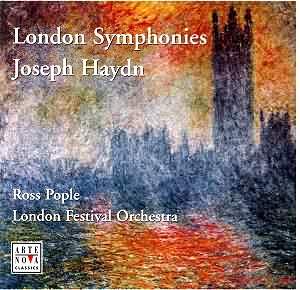HAYDN - London Symphonies 93-104.
 London Festival
Orchestra/Ross Pople.
London Festival
Orchestra/Ross Pople.
 Arte Nova Classics
74321 72109 2 (4 CDs)
Arte Nova Classics
74321 72109 2 (4 CDs)

Any new set of Haydn's London Symphonies has to compete in the listener's
affections with such tried and tested versions as those by Antal Dorati
(irreplaceable on Decca), Colin Davis (charming but profound on Phillips),
Eugen Jochum (witty and urbane) on DG and Beecham (inimitable) on EMI. Sadly,
Ross Pople and the London Festival Orchestra cannot really survive in such
illustrious company. They certainly bring some slim and lithe authentic-sounding
textures to bear on the music (the picture of the orchestra in the CD booklet
shows 12 string players and sometimes in the performances it sounds as if
the string section was even less well-endowed. Tempi are generally very quick
in the first three movements of the symphonies (especially in the slow movements,
some of which fly past without leaving much impression, though the Minuet
of the "Drum Roll" is unaccountably heavy-footed) and steadier in the Finales.
What I find lacking throughout this set is a spark of vitality and much evidence
of the composer's unique wit and charm. Haydn was one of the most original
of creators, bursting with invention though you might not think so from these
occasionally rather dull readings. The "surprise" from the symphony of that
name is less than arresting, the "military" effects do not make their mark
(as they do in Dorati's version, for example) and there are no Beechamesque
touches such as the whooping first violins at the start of the Recapitulation
of Symphony no 102 (just a dry tick here). The first movement development
section of no 102, one of the most explosive passages in Haydn's entire output,
is a very lack-lustre affair - Haydn expert H C Robbins Landon spoke of the
timpani roll leading to the recapitulation as being "hair-raising" but there
is little to lift the follicles in the LFO timpanist's dry rattle.
The performers are not helped by a very distant recording. Details in the
scores constantly fail to make an impression the sound is so lacking in
immediacy. On the whole nos 95 and 98, the symphonies which one encounters
most rarely in the concert hall, go best, no 95 in particular benefiting
from very swift tempi and sharp articulation (let down again by the recessed
recording). For the rest I remained as uninvolved as the players seemed to
be. I hope other listeners will respond more readily to the minimalist approach
to these great symphonies than I did. I cannot help but feel that by stripping
the works down to their bare bones and presenting them so plainly, most of
their wit, invention and originality has been pared away into the bargain.
Reviewer
Paul Conway

